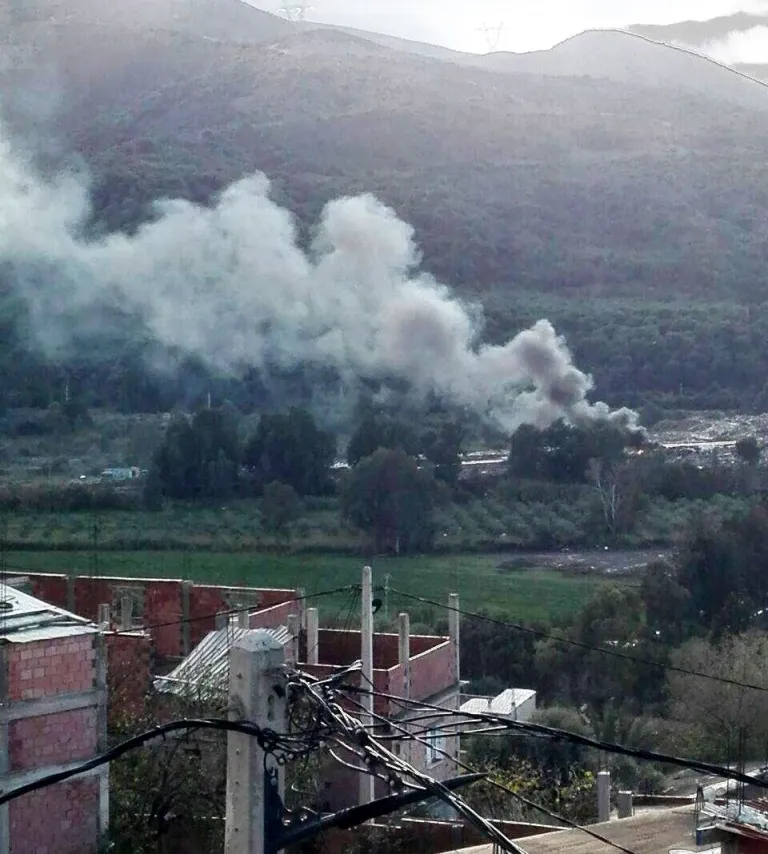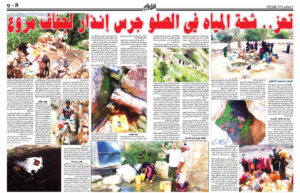Copied from Seha 7/24 website, published on 03-26-2024, article here
I wrote it: Aisha weld Habib
Air pollution poses a major threat to human health, especially in light of climate change and environmental problems that have led to the emergence of many viruses and diseases. The spread of air pollution resulting from burning waste in open spaces increases the risk of many chronic diseases and other health problems, such as heart disease, strokes, and lung cancer, in addition to chronic and acute respiratory diseases, including asthma.
Air pollution is not concentrated in one place only, but rather spreads with the speed of the wind, so burning waste can increase the negative effects on the environment and public health. Therefore, some parties seek to raise awareness of the importance of maintaining air quality and adopting healthy environmental behaviors to reduce these harmful effects.

Residents of the “Tebrant” neighborhood in Arbaa, a city located 27 km southeast of Algiers, live in difficult health and environmental conditions, as they face serious problems as a result of air pollution due to burning waste in the dump near their homes. Residents complain of unpleasant and toxic odors spreading in the air, which has negatively affected their health.
Mr. “Mohamed Hamza,” a resident of the area, is facing serious health problems as a result of this pollution emanating from the vacuum. In recent years, his health condition has noticeably worsened, especially since he suffers from chronic obstructive pulmonary disease, which has made him unable to walk and even go out into the open air, due to the widespread smoke and harmful gases emanating from the place.
You can listen to his story, his personal experience, and how air pollution affected his life, through this audio recording.
Voice from behind The Blockage: The Story of Mr. Muhammad
Residents of the city of Wednesday, near the waste burning dump, suffer from many health problems due to the harmful effects of burning waste. Including, chronic obstructive pulmonary disease, asthma, cough, bronchitis and others. When interviewing residents on Wednesday, it was clear that there is a temporal relationship between their illnesses and burning waste. Most of them became ill after the burning operations began, while for others their illnesses worsened.

Tebrant neighborhood on Wednesday
These diseases may be caused by other factors. The rate of air pollution resulting from burning waste in open spaces, exposure to these gases, and the spread of some respiratory diseases indicate the existence of a causal relationship between air pollution from burning waste and poor health conditions in the local community.
In the same context, Professor Merzak Gharnaout, head of the Department of Chest and Respiratory Diseases at Beni Messous University Hospital, explained that diseases resulting from respiratory allergies rank fourth among the most common diseases in the world, and have become a heavy burden in Algeria, especially asthma, respiratory problems, and inflammation. The nose is the most common, expressing his dissatisfaction with the presence of several factors that aggravate the patient’s condition, especially environmental pollution resulting from the emission of toxic gases from burning waste, means of transportation, factories, etc. Therefore, this problem has become a source of concern and concern for many experts in the field of medicine.
In his speech, Garnaout pointed out the seriousness of the causes that affect the health of the respiratory system, which can lead to respiratory failure in the bronchial tubes, and increase the possibility of developing chest cancer.
Other causes of respiratory diseases
In addition to the causes mentioned by the specialist, there are several other factors that can contribute to the emergence of respiratory diseases, including:

The World Health Organization estimates in 2019 that air pollution causes about 4.2 million premature deaths annually in the world. This is due to exposure to small particulate matter that leads to respiratory diseases, heart diseases, stroke, and cancers. 23℅ of these deaths were due to chronic obstructive pulmonary disease and acute lower respiratory tract infections, and 11℅ were respiratory cancers.
We met Professor Sufyan Halasa, Professor of Chest Diseases, at the “5th Annual Pulmonary Arterial Hypertension and Rare Diseases” Conference. He told us about the relationship between environmental toxins and their impact on respiratory patients, especially in the case of chronic obstructive pulmonary disease, saying, “The relationship between “Environmental toxins and better health because various pollutants are a critical risk factor, as they are responsible for chronic and acute disorders that contribute to the exacerbation of the disease.” “Any burning of waste produces large amounts of carbon monoxide and carbon dioxide, and this leads to lung destruction.”
He continues, saying, “Chronic obstructive pulmonary disease is a general definition for a group of diseases that cause obstruction in the bronchial tubes. The obstruction increases as a result of inflammation of the bronchial wall and lung tissue. People with it are at greater risk of health when exposed to particulate pollution compared to healthy people.”
Toxic gases cause the spread of respiratory diseases

A report issued by the World Health Organization (WHO) in September 2021 stated that there are six pollutants that negatively affect air quality and cause harm to health. Among these traditional pollutants are particulate matter (PM), ozone (O₃), nitrogen dioxide (NO2), sulfur dioxide (SO2), and carbon monoxide (CO). Actions taken on these traditional pollutants have shown that they also reduce the spread of other harmful pollutants. On health.
In a scientific study prepared by the US Environmental Protection Agency (EPA), it was found that there is a link between exposure to high levels of air pollutants and an increase in the incidence of respiratory diseases. These particles deposited in the respiratory system can provoke a strong inflammatory response, lead to cell damage, and exacerbate the condition of some diseases, including: This applies to patients with chronic obstructive pulmonary disease and asthma.
Particulate pollution can affect people with chronic obstructive pulmonary disease. Continuous and repeated exposure to these polluted particles impairs lung function and accelerates the development of obstructive pulmonary disease, and thus clinical disorders appear, including emphysema, bronchiectasis, and bronchitis. People with this disease are susceptible to People are at greater risk of health when exposed to particulate matter pollution than healthy people.
Professor Ahmed Qadi, Head of the Lung and Allergy Department at Beni Messous Hospital, revealed during a training scientific meeting with journalists specialized in the health field, that Algeria is witnessing an increase in cases of respiratory diseases, especially for neighborhood residents and those who live in front of places that suffer from the problem of air pollution. The same specialist added, “Exposure to pollutants emitted from burning waste can lead to the appearance of several symptoms such as inflammation of the nose, eyes, and throat, difficulty breathing, and increases asthma attacks and chronic and acute bronchitis. This smoke also carries several carcinogenic substances that harm the immune and hormonal systems.” And particles.”
Despite all the efforts and measures taken by Algeria to develop plans and strategies for waste management and disposal in modern and healthy ways, some illegal practices are still practiced in some municipalities, which poses a serious threat to the health of the population and the environment.
In recent years, the residents of the Tebrant neighborhood have been exposed to an extreme state of emergency. Several suffocations and mass faintings were recorded due to the burning process, and it extended to several neighboring neighborhoods. The residents demanded immediate solutions to relieve them of their suffering from this viciousness and the repeated burning operations. Returning to what we see today, the problem of burning waste in the open air in front of Wednesday residents is still continuing and is practiced in random ways without supervision!

These dangerous practices can expose the health of the population to many effects. The risks of emissions from open-air incinerators can produce fine particles, volatile organic compounds, dioxin, polychlorinated biphenyls, and polycyclic aromatic hydrocarbons, all of which are linked to serious diseases such as cancer and heart disease. Skin diseases and others.
Cooperation between sectors
Mrs. Badr El-Din Saeeda, official of the General Directorate of Prevention and Health Promotion at the Ministry of Health, called for the importance of cooperation between various sectors to protect citizen health.
The official at the Ministry of Health said, “We strongly encourage cooperation between various sectors, including the Ministry of Environment, Interior, and Agriculture, to preserve citizen health and ensure that there are no deficiencies that lead to a deterioration in health conditions and the resulting treatment provision.” Especially what we are witnessing in recent years has become the health sector. It is one of the sectors that bears all these responsibilities the most, behind these practices and failures, in addition to their cost to the health of citizens and the environment. It also costs the sector a large budget, because the increase in the incidence of respiratory diseases, such as asthma and arterial diseases, makes governments and individuals incur additional expenses for treating these conditions. .
In the context of her speech, she pointed out that disease prevention does not only concern the health sector, but rather is the responsibility of all other sectors.
Mrs. Badr El-Din explained that eliminating waste through dangerous and unhealthy methods, such as burning, has a negative impact on the health of citizens and the environment, which causes a high incidence of respiratory diseases and results in many problems.
She added, “Officials must take the necessary measures to educate the community and teach them how to preserve their environment, and we must start this culture from childhood through environmental education in schools, cultural and health activities, all the way up to the municipal workers responsible for waste.” “Everyone must realize that the environment affects “All aspects of our lives, from the air and water to the food we eat, so we must be careful to protect them and work to improve them.”
An official said, “We have several studies on air pollution in some Algerian regions. We, at the National Health Institute in Oran, worked in cooperation with the competent authorities, including Belgian partners, to set up “receivers” to study air pollution in three states,” Algiers, the capital. Annaba, Oran “to improve environmental and health conditions. We are also working to train specialists in this field and we will continue to use the results and recommendations from this study to develop effective health and environmental policies.”
“We are all responsible for what happens in our environment and surroundings, and every individual must take the necessary measures to maintain a healthy environment, because we are obligated to future generations to provide a sustainable healthy environment.”
Impact of major emissions on air quality
In this context, a specialist in national preparation, adaptation to climate change and environmental protection, a professor at the University of Khemis Miliana in Algeria, Ezzedine Madani, explains that the process of burning waste that takes place at the level of residential neighborhoods has serious effects and a direct impact on the environment, as the main emissions refer to gases and particles. Small amounts released into the air, these emissions play a major role in affecting air quality and causing environmental problems. Suspended particles in the air (PM), such as fine particles (PM2.5) and (PM10), are considered very harmful. They also affect volatile hydrocarbons and nitrogen oxides on the soil and air, in addition to contributing to the formation of toxic fog and other effects.
On the other hand, gaseous emissions such as carbon dioxide (CO2) can affect climate changes and cause an increase in temperatures. Toxic emissions affect plants and wildlife, as the effect also affects water quality due to the leakage of chemical compounds into the water, which affects the quality of water and marine organisms.
Regarding the quality of burned waste, Professor Ezz El-Din says that burning plastic containing flame retardant materials can lead to the release of dangerous chemical compounds and highly toxic particles, which affects air quality. Wood treated with chemicals may contain hazardous compounds when burned. Burning oils and fats also releases harmful gases and particles, which can be dangerous to health. Electronic and electrical devices contain dangerous substances such as mercury, lead, and cadmium, and burning them can lead to the release of these toxic substances.
Professor Maamriya Aisha Baya, an expert in the environmental field, believes that burning does not lead to “the disappearance of waste,” but rather turns it into bottom ash, ash, and rifum (residues of purifying vapors resulting from burning household waste), and also results in toxic emissions, including particulate matter (PM). ), carbon monoxide (CO), acid gases (such as nitrogen oxides, sulfur dioxide, and hydrochloric acid), acid particles, some metals (cadmium, lead, mercury, chromium, arsenic, and beryllium), and dioxins. Furans, polychlorinated biphenyls (PCBs), and polyaromatic hydrocarbons (PAHs).
- Maamriya considered that air pollution poses a threat to all of us, and we cannot accept that these practices continue among the population and that they are exposed to the inhalation of these toxic emissions. If we do not move very quickly, sustainable development in Algeria will remain just a distant dream. Therefore, we must work together to find solutions to use and produce renewable energy more efficiently, and focus on managing waste in a healthy way.
Regarding methods of waste disposal, Professor Madani says that resorting to the method of backfilling waste must be considered as a last option after exploring the most sustainable and environmental alternatives. He considered that the effects related to “backfilling waste” are many, including soil and water pollution that occurs from the leakage of harmful chemicals into the soil. and groundwater, leading to environmental pollution. In addition to the production of greenhouse gases that occur from biological decomposition processes in waste when backfilling, which leads to the production of methane gas, which is a gas that can contribute to climate change. In addition to odor and air pollution, which affects air quality and health.
Regarding the impact of air pollution on the economic aspect, expert Madani believes that it affects several aspects and the impact also appears on the agricultural sectors because air pollution can affect plants and crops, causing losses in agricultural production. This leads to a decline in the range of food available and an increase in its prices.
Air pollution also leads to loss of productivity in several sectors, and can have a negative impact on workers’ health and ability to perform, leading to an increase in absenteeism from work and a reduction in overall productivity. We also find an impact on tourism, as air pollution affects industries that depend on tourist attractions, as polluted air may be a factor that discourages tourists from visiting affected areas.
Expert Madani proposes a plan to confront the problem of burning waste, and it can be distributed according to the following points:
- Rely on more sustainable alternatives through recycling and sorting because encouraging recycling reduces the volume of waste heading to landfills and reduces initial resource consumption.
- Organic decomposition and energy production from organic waste can be used, such as biogas production.
- Using clean technology to dispose of waste in environmentally friendly ways, such as biodegradation, in which bacteria and fungi are used to convert organic waste into organic materials and fertilizer.
- Completing high-quality environmental impact studies and risk studies for all projects that have an impact. This is to reduce risks to the environment and humans by proposing procedures in some cases that require large financial costs.
Pioneering experiences in waste management

To achieve this, some examples must be presented from the world and other societies that have found solutions to the waste problem. Several countries are working to develop waste management to reduce the impact on the environment and human health. Professor Madani mentioned some countries, saying, “Singapore is a model of a city that effectively deals with challenges related to waste. It relies on biodegradation and recycling technology to convert waste into energy. Sweden is very advanced in managing waste in sustainable ways, by burning waste to produce energy and converting ash into building materials. It also aims to achieve “zero waste.” Japan, for its part, relies on technology, including thermal analysis and recycling, and has successful initiatives to separate waste and motivate citizens to sort waste. As for South Korea, it has adopted a comprehensive waste management system that focuses on bioanalysis and recycling. The latest technologies are used to convert waste into energy.”
On the other hand, Germany adopts a comprehensive approach to waste management that focuses mainly on careful sorting and recycling, burning plastic waste in a correct and sound manner to produce energy and recycling it at a high rate. New Zealand relies on sustainable strategies, including decomposing organic waste to produce compost and using modern technology to dispose of solid waste. Switzerland seeks to achieve zero waste by investing in biodegradation and thermal analysis technologies. The same measures are in Canada, especially in Montreal, which has taken steps towards achieving the goal of zero waste by 2030, where citizens are encouraged to recycle and sort, and technologies for analyzing waste have been developed.
Legal mechanisms for waste management
The Ministry of the Environment, which is responsible for environmental monitoring, has developed a national plan to manage waste management in all states of the country, but it seems that the laws regulating the waste disposal process are not implemented and that the field outputs of the state committee for monitoring and support were not heeded. In some states in Algeria, there is an excessive amount of open dumping and burning in the air. Going out in front of residents is an unsound practice, causing danger to the health of residents and the environment.
Article 32 of Law No. 19_01 of 12_12_2001 relating to waste management, control and removal, which is the first legal framework regulating waste management, stipulates that the process must be accompanied by a set of principles, including the principle of “preventing and reducing the production and harm of waste at the source,” in addition to “rational environmental treatment.” Which is carried out according to conditions that conform to environmental standards, especially not endangering human health and the environment, posing dangers to environmental elements, causing nuisance with unpleasant odors, or harming views and sites.”
Environmental experts and professors called for the necessity of imposing legislation that respects the environment to address the imbalances recorded in the waste collection and dumping process, and for more stringent legislation.
All these efforts have been made by Algeria in various wings in order to control the waste management and management system through legal and institutional mechanisms. It can be said that the Algerian legislator has greatly reduced the legal gaps in the field of waste and also issued Decree No. 84-378 related to urban waste and Law No. 83-03, which It was replaced by Law No. 01-19, which was mentioned previously.
In a study prepared by the National Waste Agency, it clarifies the quantitative assessment of waste in Algeria between the years 2019 and 2021. According to the data, the amount of waste in 2021 amounted to about 11.1 million tons, meaning an average of 0.68 kg per capita per day for 46.5℅, while the year 2019 recorded about 12.6 million tons, i.e. an average of 0.68 kg per capita per day. 0.8 kg for 53.5℅.
Quantitative assessment of waste in Algeria between 2019-2021

Despite the results achieved in reducing the amount of waste, Algeria remains far from international standards with regard to waste recovery, classification, and control. Based on estimates by the National Waste Agency, the amount of household waste represents 75% of the total waste. On the other hand, Algeria’s share is estimated at a daily average of 1.2 kg. In large cities and between 0.5 and 0.8 kg in medium and small cities, it is therefore among the highest levels for the North African region, where household waste production rates are estimated at between 170 kg and 190 kg annually.
Roses Association for Environmental Protection
The President of the Roses Association for Environmental Protection, Mrs. Yasmine Balakoun, expressed her dissatisfaction with such practices, which exacerbate the problem of burning waste, stressing that her association has monitored such actions, and despite the awareness and sensitization campaigns over the past years, these violations are still recorded every time. In the context of her speech, she called for the need to intensify oversight and work with various local bodies to reduce these behaviors that negatively affect the health of citizens and the environment. She also encouraged the organization and management of waste by establishing organized dumps with appropriate standards for backfilling away from residents and arable green spaces.
She added that the random burning of this waste affects the atmosphere through circulating gases that cause health and environmental disasters.
National Association of Algerian Volunteers Dzayer benévole

We met Mr. Karim Ben Amer, President of the National Association of Algerian Volunteers, during our participation in the International Cleaning and Disinfection Salon, which was organized under the supervision of the Ministry of Environment and Renewable Energies. During the meeting, Ben Amer discussed recent developments in the waste sector in Algeria, and made some recommendations to improve this sector.
Ben Amer stressed that Algeria has attached great importance to the waste sector by supporting investments and opening the way for emerging institutions concerned with waste recovery and recycling issues, based on scientific studies and research.
He pointed to the increase in waste collection activity by interested youth, and the establishment of institutions specialized in recycling and treating household waste, especially plastic. He pointed to the increasing demand for collecting plastic, aluminum, glass, rubber tires, etc., compared to people who burn waste without benefiting from it.
Regarding environmental culture, Karim raised the question about the difference between a person who collects waste to recycle it and one who burns it unconsciously. He stressed the necessity of combating these dangerous phenomena for the environment and humans, and the importance of working to reduce the risks of climate change and adapting to it, and reducing greenhouse gases that cause global warming.
Karim concluded by emphasizing that youth associations and initiatives are considered a fundamental pillar in achieving sustainable development, by developing the waste economy and reducing its spread in Algeria, and called for the need to intensify efforts among all sectors to win the waste battle and achieve the green economy.
Burning waste is considered an important source of polluting materials, and contributes to climate change due to its increased emissions that affect the environmental balance.
Even people who are aware of the negative effects of burning waste may resort to it as an option due to prevailing customs or the lack of suitable alternatives. Therefore, the level of awareness must be raised about the serious health effects of these practices, and the capabilities of local authorities in waste collection must be strengthened.





